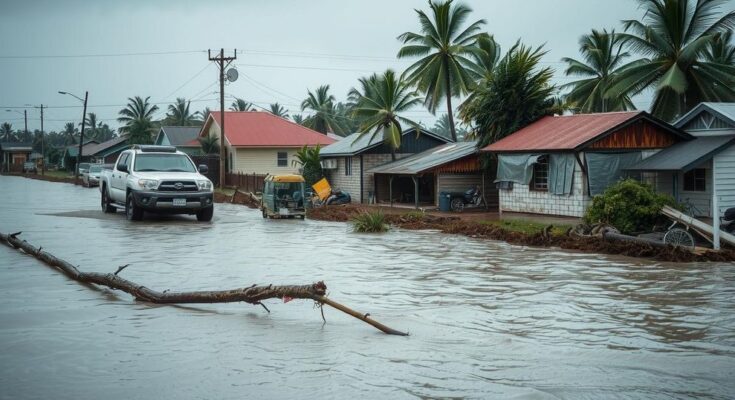Cyclone Chido has claimed 75 lives in Mozambique, nearly doubling the initial estimate. The cyclone affected Cabo Delgado, a region already disrupted by conflict, leaving many communities further devastated. Significant destruction was reported in Mecufi, with numerous individuals now facing compounded hardships from both conflict and climate impacts.
The death toll from Cyclone Chido in Mozambique has tragically increased to 75, nearly doubling previous estimates, as reported by the government. The cyclone struck Cabo Delgado, a region already reeling from an extensive insurgent conflict, which forced hundreds of thousands to abandon their homes. Rescue workers are now reaching isolated areas, revealing significant devastation. At least 69 fatalities and around 740 injuries have been documented, with much destruction noted in Mecufi, a district where many infrastructures were obliterated. Images from the field illustrated the extent of the damage, with mud walls washed away and wooden houses reduced to debris. The health infrastructure also suffered greatly, as the maternity clinic’s roof was torn off and essential medical equipment was displaced.
Moreover, it is estimated that approximately 10,000 individuals living in tents in Chiure district were directly affected. With their lives already disrupted by conflict, these communities are now further burdened by the consequences of this environmental disaster. Cyclone Chido brought wind speeds comparable to a Category 3 hurricane, impacting not only Mozambique but also causing fatalities in Mayotte prior to making landfall in Zimbabwe. The U.N. refugee agency has cautioned that this cyclone could herald a season marked by severe weather patterns typical of the region.
Previous cyclones, such as Tropical Cyclone Freddy and Cyclone Gombe, have posed similar threats, resulting in numerous casualties. These recurring extreme weather events have displaced nearly 140,000 individuals in Mozambique over the past years, highlighting a critical trend exacerbated by climate change. The ongoing humanitarian crisis in Cabo Delgado will likely worsen if immediate actions and interventions are not prioritized to support the affected populations and restore essential services.
Cyclone Chido’s impact underscores the challenges faced by Mozambique, one of the world’s poorest nations, particularly vulnerable to climate change. The Cabo Delgado province has been embroiled in a protracted insurgent conflict, which has contributed to widespread displacement and precarious living conditions for hundreds of thousands of individuals. The annual weather patterns in the region frequently lead to the emergence of destructive cyclones and extreme flooding, making it crucial for the international community to recognize the urgent humanitarian needs of those affected.
In conclusion, the devastation wrought by Cyclone Chido in Mozambique exacerbates an already dire humanitarian situation, resulting from prolonged conflict and environmental vulnerabilities. The significant increase in casualties and the level of destruction reported illuminate the urgent need for humanitarian assistance and sustainable measures to alleviate the chronic challenges faced by the populations in affected regions. The prevalence of such extreme weather conditions emphasizes the importance of addressing climate change and enhancing community resilience.
Original Source: www.nytimes.com




